Are you tired of drill bits that break or dull quickly? I know I have been. It’s frustrating to stop in the middle of a project because your drill bit can’t handle the material.
The strongest drill bits are generally made from carbide1 or cobalto2. They can withstand high temperatures and are less likely to wear down, making them ideal for drilling into hard materials3.
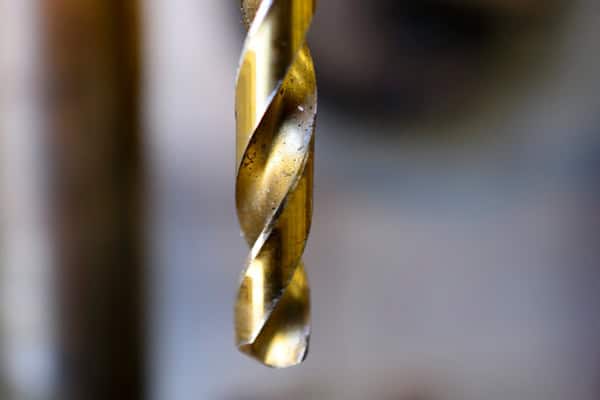
Keep reading, and I’ll help you understand which drill bit is best for your projects. I’ll also share some tips I’ve learned over the years to make your drill bits last longer.
Drill Bits! HSS vs. Titanium vs. Carbide or Cobalt?
Ever wondered what all those letters on your drill bits mean? It can be confusing, but understanding the differences can save you time and money.
HSS (Aço de alta velocidade4) drill bits are good for general use because they are versatile and cost-effective. However, for harder materials, you might want to consider titânio5, cobalt, or carbide bits.
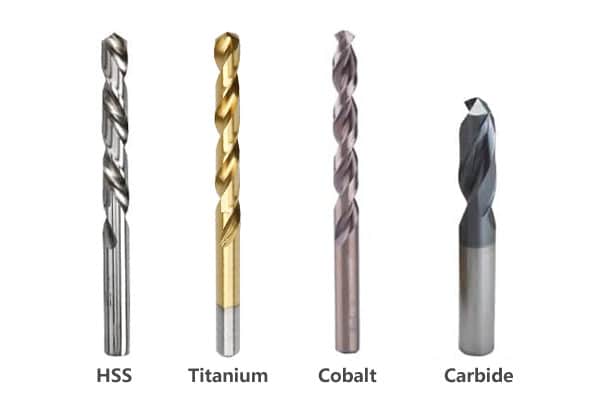
Understanding HSS Drill Bits
HSS drill bits are made from carbon steel with some other metal mixed in. But, they are not the best for really hard stuff because they can get dull quickly. I use these for plastic, and softer metals like aluminum.
Titanium Drill Bits Explained
Titanium drill bits are HSS bits that have a titanium nitride coating. This makes them harder and protects them from rust. They can drill through most metals. The bad thing is that the coating can wear off, and you can’t sharpen them. They don’t handle heat as well as cobalt. I usually use these for drilling metal6, including sheet metal.
Cobalt Drill Bits: When to Use Them
Cobalt drill bits have 5-8% cobalt in them. This makes them better at handling heat and makes them last longer than HSS and titanium bits. You can also sharpen them. They cost more, and they can break if you use them at high speeds. I use these for hard steel, stainless steel, and tough materials.
Carbide Drill Bits: The Ultimate Choice for Hard Metals
Carbide drill bits are made from carbon and heavy metals like tungsten. They are the strongest and last the longest. They can handle a lot of heat and are excellent for drilling into hard metals, even work-hardened ferrous metal. Because of their strength, carbide metal drill bit sets are multi-purpose and can be used for creating holes of different sizes, improving efficiency in metalwork shops and other industrial settings.
I remember one time I was trying to drill through a stainless steel sheet with an HSS bit. It took forever, and the bit was completely dull afterward. Then, I switched to a cobalt bit, and it went through like butter! That’s when I learned the importance of using the right drill bit for the job.
The Benefits of Using High-Speed Drill Bits in Your Projects
Why choose high-speed steel (HSS) drill bits? What makes them so popular for both DIYers and professionals?
HSS drill bits offer faster drilling speeds7, increased precision, and better durability8. They are designed to withstand the heat generated by friction, making them a valuable tool for metalworking and other DIY tasks.
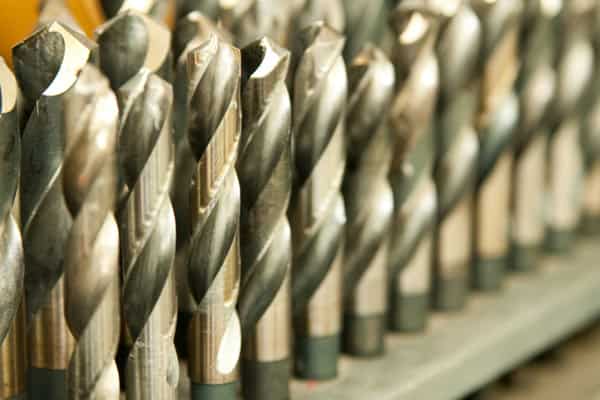
The Heat Resistance of HSS Bits
HSS drill bits are made from steel mixed with chrome, which helps them resist heat. This is important because drilling makes heat, and too much heat can damage the bit.
Accuracy in Drilling
HSS bits allow for accurate drilling, which is important for detailed work. These bits help ensure accuracy in drilling holes of diverse sizes.
Adaptability with HSS Drill Bits
You can use HSS bits on different materials, like plastic, and metal. Also, if the drill bit has lost its edge, it’s easier to grind and sharpen than other steel.
How to Make a Twist Drill Bit Cut Faster?
Is your drill bit struggling to cut through materials? There are several ways to improve its performance and make it cut faster.
To make a twist drill bit cut faster, you can try increasing the speed and pressure, using cutting fluid9 to reduce friction, and ensuring the bit is sharp. Also, consider using a pilot hole10 for more accurate drilling.
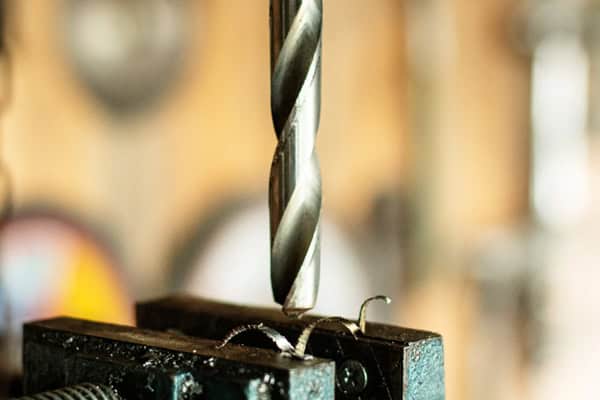
Adjusting Speed for Different Materials
Change the drill speed based on what you’re drilling. If you’re working with plastic, use higher speeds. For harder materials like metal, use slower speeds.
The Right Amount of Pressure
Apply steady pressure while drilling. Don’t push too hard, or the bit might break. Let the drill bit do the work.
The Role of Cutting Fluids
Cutting fluid, or lubricant, lowers heat, which helps the drill bit cut faster and last longer. Use cutting fluid when drilling metal.
Keeping Your Drill Bits Sharp
A dull drill bit is not good and needs more force to cut. Sharpen your drill bits often to keep them cutting well. I’ve found that sharpening my drill bits regularly makes a huge difference in their performance.
Pilot Holes for Accuracy
For larger holes, drill a small pilot hole first. This helps guide the larger bit and makes it easier to drill straight.
Choosing the Correct Bit Type
Make sure you’re using the right drill bit for the material. Use a metal drill bit for metal.
Clearing Away Debris
Remove debris from the hole often to keep the drill bit from getting stuck. One of the challenges Alex faces is inconsistent quality, but sharpening bits and selecting the correct one will make the result more desirable.
Can I Use a Metal Drill Bit to Drill a Concrete Wall?
Thinking about using that old metal drill bit for your concrete wall project? Before you do, it’s important to understand the right tools for the job.
You should not use a metal drill bit to drill into a concrete wall. Metal drill bits are not designed to withstand the hardness and abrasiveness of concrete. Instead, use a broca de alvenaria11 with a carbide tip12.
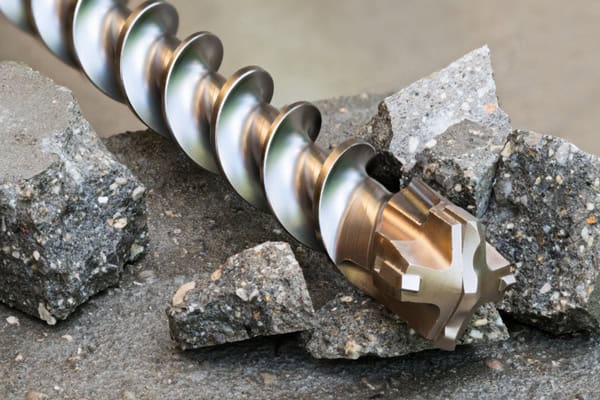
Why Metal Bits Fail on Concrete
Concrete is hard, and metal drill bits will quickly become dull or break when used on concrete.
What Makes Masonry Bits Different?
Masonry drill bits are made for drilling into concrete, brick, and stone. They have a carbide tip that can handle these materials.
The Importance of a Carbide Tip
Masonry drill bits have a tip made of tungsten carbide, which is very hard and strong.
Using a Hammer Drill
When drilling concrete, use a hammer drill. This type of drill uses a hammering motion to break up the concrete.
Flute Design and Debris Removal
Masonry drill bits have a special design that helps remove debris from the hole.
Designed for Toughness
They are made to handle the impact, wear, and heat from drilling concrete. I’ve seen people try to use metal drill bits on concrete, and it never ends well. The bit either breaks or gets so dull that it’s useless. Save yourself the frustration and invest in a good set of masonry drill bits.
Conclusão
Choosing the right drill bit can make all the difference in your projects. Whether you’re working with metal, or concrete, understanding the properties of different drill bit materials will help you achieve the best results.
-
Exploring this link will provide insights into the advantages of using carbide drill bits for various applications. ↩
-
This resource will explain why cobalt drill bits are favored for their durability and effectiveness in tough drilling tasks. ↩
-
Discover effective techniques and tips for successfully drilling into hard materials, enhancing your drilling skills. ↩
-
Explore the benefits of High-Speed Steel drill bits for various applications and their cost-effectiveness. ↩
-
Discover why titanium drill bits are preferred for harder materials and their durability. ↩
-
Discover expert tips and techniques for drilling metal to achieve better results and prolong tool life. ↩
-
Learn how faster drilling speeds can significantly boost productivity and reduce project time in metalworking tasks. ↩
-
Discover the factors that contribute to drill bit durability, ensuring long-lasting performance in demanding applications. ↩
-
Explore how cutting fluid can enhance drilling efficiency and prolong tool life, making your projects smoother and faster. ↩
-
Learn about the advantages of drilling a pilot hole for precision and reduced bit wear, ensuring better results in your work. ↩
-
Explore this link to understand the benefits and proper usage of masonry drill bits for concrete drilling. ↩
-
Learn about carbide tips and their significance in enhancing the durability and performance of drill bits. ↩